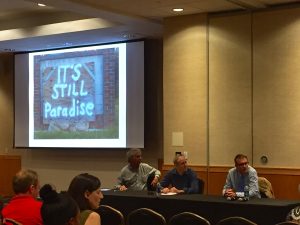
Visiting scholars shared diverse insights into Florida’s environment as the UCF History Department and the Florida Historical Quarterly presented the seventh annual Jerrell Shofner Lecture on Florida History and Culture.
“Perspectives on Florida’s Environment,” featured a panel of three speakers, whom Dr. Connie Lester, associate professor of history and editor of the Florida Historical Quarterly described in her introduction as being among “the foremost historians of this state’s history.”
Dr. Mike Gunter Jr., who teaches courses on environmental politics, sustainable development, and international security at Rollins College, began the panel by discussing the impact of climate change on Florida’s environment, noting that the state is “feeling the heat–literally,” and describing Florida as one of several states that are “ground zero for climate change in the United States,” and whose residents “need to take notice” that “our environment is changing.”
Dr. Chris Wilhelm teaches on modern U.S. history, environmental history, and the history of the U.S. South at the College of Coastal Georgia. Wilhelm presented on “Sea-Grassroots Environmentalism” and discussed the history of environmental and conservation advocacy and activism in Florida, particularly efforts to introduce legal restrictions on dredging and filling and to preserve marine environments.
Dr. Steven Noll, a faculty member in the Department of History at the University of Florida, traced the history of Floridians’ relationship with water, beginning with Ponce de Leon’s search for the mythical Fountain of Youth. He continued with discussion of environmental tourism in the nineteenth century and concluded with descriptions of twentieth century efforts to change the hydrology and topography in Florida in order to make land accessible to agriculture and development, and today’s environmental restoration initiatives.
“Roundtable on Florida’s Environment” offered a discussion between scholars about Florida environmental history. As part of the roundtable, two authors of recent books about Florida’s environment answered questions posed by moderator, Dr. Mark Hersey, associate professor at Mississippi State University and co-editor of Environmental History.
 Dr. Jack Davis and Dr. Michele Navakas discussed their recollections of growing up in Florida, and how their experiences there spurred them to write books about the state’s natural environment. Navakas emphasized Florida’s ability to foster adaptability in its residents given its ever-changing landscape, which she called “generating new and more sustainable ways of taking root.” Davis discussed his decision to write a “biography of place” about the Gulf of Mexico, which he argues holds an important role in the United States’ “national narrative,” and the “loss of green spaces and water spaces” he has witnessed in Florida since his childhood.
Dr. Jack Davis and Dr. Michele Navakas discussed their recollections of growing up in Florida, and how their experiences there spurred them to write books about the state’s natural environment. Navakas emphasized Florida’s ability to foster adaptability in its residents given its ever-changing landscape, which she called “generating new and more sustainable ways of taking root.” Davis discussed his decision to write a “biography of place” about the Gulf of Mexico, which he argues holds an important role in the United States’ “national narrative,” and the “loss of green spaces and water spaces” he has witnessed in Florida since his childhood.
Davis, a professor of history specializing in environmental history and sustainability studies at the University of Florida, is the Pulitzer Prize-winning author of The Gulf: The Making of an American Sea (2017). Navakas is an associate professor of English and affiliate of American Studies at Miami University of Ohio, where she teaches early American literature, culture, and environment. She is the author of Liquid Landscape: Geography and Settlement at the Edge of Early America (2018).
The Jerrell Shofner Lecture series honors the late Dr. Jerrell Harris Shofner’s legacy as an editor, scholar, and historian. At various times during his eighteen-year career at UCF, Dr. Shofner served as the chair of the UCF history department, the President of the Florida Historical Society, and the editor of the Florida Historical Quarterly. Dr. Shofner retired from UCF in 1990, and passed away in 2017.